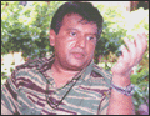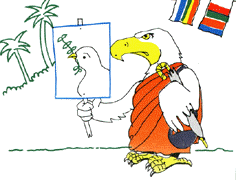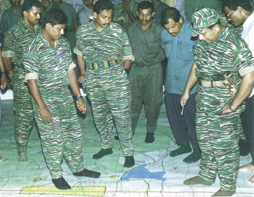|
Velupillai
Prabhakaran

Maha Veerar Naal Address
மாவீரர் நாள் -
National Heroes Day
National Heroes Day - November 27, 1999
1.English
Translation of Address
2.Address
in Tamil
�Though the LTTE stands today as a
formidable force� with the military capability to liberate
our homeland, we have not abandoned the path of peace. We
want to resolve the Tamil conflict through peaceful means;
through civilised methods without recourse to bloodbath and
destruction of life...
English
Translation of Address
My
beloved people of Tamil Eelam,
 "Today
is Maha Veerar Naal... "Today
is Maha Veerar Naal...
...Our current military successes have surprised and astounded the world.
This is a unique historical achievement in the art of contemporary warfare. The
dimensions of this military victory have not only amazed our enemy but also
astonished
several international countries that have been actively helping Sri Lanka�s
war effort by providing training, arms and funds.
The vast tracts of fertile lands of Vanni, which were invaded and occupied by
the Sinhala armed forces afters years and months of massive military campaigns,
after sacrificing thousands of lives, have been liberated by our fighters at a
rapid pace within a short span of time. A colossal military structure with its
multiple military complexes, well fortified bases and camps suddenly collapsed
with the onslaught of the Tiger offensive. We have liberated almost all the
ancient strategic towns in the Vanni region. I am happy that we have redeemed a
sector of Manal Aru, which is the heartland of Vanni where the state�s army
massacred the indigenous Tamils and created Sinhala settlements.
Our massive offensive campaign in Vanni code-named �Unceasing Waves 3� has
effectively demonstrated to the world the extra-ordinary growth and development
of the Tiger fighting forces in the art of modern warfare. The speed of our
strikes, the ability of rapid deployment, the unified command, the high
discipline, the spectacular offensive tactics and the tremendous courage
displayed by our fighting formations have astounded the world military experts.
This war is being waged for liberation of our land.
Tamil Eelam is our homeland, a land which belongs to us historically, a land
on which we were born and bred, a land of our sustenance and resources, a land
that forms the very foundation of our national identity. Our enemy claims that
this land belongs to him.
For more than fifty years - ever since the Sinhala chauvinists assumed political
power in the island-
the lands of the Tamils have been systematically usurped. Our land has been
subjected to tyranny
and oppression. On one side, there have been devious schemes by which our
lands have been forcefully annexed and given to Sinhala colonisers. On the other
hand ,our lands have been militarily occupied and their resources destroyed and
the people who lived on those lands have been reduced to the state of
destitution. It is against this injustice we have been fighting. Therefore our
liberation war is essentially a war to liberate our lands and to
establish our sovereignty: our right to rule in our homeland.
Our people have now understood the aim and objective of this liberation war. Our
people, who have lost their lands and the livelihood that derived from the lands
and have become destitute, realise the value and significance of their own
lands. They also realise the necessity of chasing away the alien forces that
have invaded and occupied our territories. It is because of this realisation
wide sections of the popular Tamil masses are supporting and participating in
this war of liberating our homeland. Our liberation war has now expanded and
developed into a higher stage as the people�s war of liberation.
In my annual speeches on the Martyrs�
Day, I have always emphasised the importance of peace and peaceful ways of
seeking a negotiated political settlement. At the same time, I have also pointed
out the fact that
Sinhala Buddhist chauvinism was not prepared to resolve the ethnic conflict
through peaceful means.
The two major Sinhala political parties, who have assumed political power
alternatively in the Sri Lankan political system, are essentially chauvinistic
organisations. Both these political parties have bred and flourished in the
anti-Tamil Sinhala Buddhist racist ideology.
For the last half a century these parties competed with each other in
intensifying the oppression against the Tamil people. In this diabolical
history of racist oppression it is Chandrika�s regime which has inflicted
the worst
form of tyrannical oppression.
The five-year rule of Chandrika has
been a curse on the Tamil people. The monumental tragedy that our people
encountered in the form of war,
violence,
death,
destruction,
displacement,
hunger
and starvation was the worst form of tyranny ever suffered by the Tamils.
Chandrika�s oppressive rule marks an epoch consisting of blood stained pages of
our history. Her tyrannical rule left a permanent scar on the soul of the Tamil
nation.
While masterminding an authoritarian tyrannical rule against the Tamils
internally, Chandrika Kumaratunga portrayed herself internationally as
a goddess of democracy committed to peace. Having implemented a notorious
military programme aimed at the total invasion of the Tamil homeland she
interpreted her project
as a war effort for peace. The entire international community believed her
and supported her
military project. In this deceptive disinformation campaign to cheat the
world, treacherous Tamil elements played a crucial role.
internationally as
a goddess of democracy committed to peace. Having implemented a notorious
military programme aimed at the total invasion of the Tamil homeland she
interpreted her project
as a war effort for peace. The entire international community believed her
and supported her
military project. In this deceptive disinformation campaign to cheat the
world, treacherous Tamil elements played a crucial role.
We do not trust Chandrika.
She does not have the honesty and determination to resolve the Tamil national
conflict in a fair and reasonable manner. We perceive her as a modern
representative of a neo-Sinhala-Buddhist chauvinism. It is for this reason we
refused to engage in a direct dialogue with her. Yet, we did not close the doors
for peace. I made an announcement last year
in my Martyrs� Day message that we were prepared for peace talks with the
assistance of international third party mediation.
Though we called for third party mediation we have emphasised the necessity of
creating certain objective conditions conducive for peace talks. We explained
very clearly that these objective conditions entail a situation of normalcy free
from military aggression, occupation and economic strangulation of the Tamil
nation.
Chandrika�s government refused to accept our proposal for creating a congenial
peaceful atmosphere for peace talks. Chandrika was not prepared to bring an end
to the war, to stop the military aggression of our land and to lift the economic
blockades. The government wanted to use the military campaigns and the
economic embargoes as political pressures on the Tamils.
The concept of the �war for peace� as enunciated by Chandrika�s government
signified a military solution. This grand military project aimed at a total
invasion of the Tamil homeland and envisages the defeat of the Tamil Tiger
movement and finally the eventual subjugation of the Tamil nation. Chandrika
worked tirelessly for the last five years to implement her military scheme.
Though the project brought about severe setbacks and debacles to the armed
forces, she was determined not to abandon her military programme. Therefore, she
did not reflect seriously about peace nor has she taken any constructive steps
towards peace talks.
Chandrika conveyed to us a message through third party source that she was
prepared to hold secret talks with certain conditions while continuing the war
effort. We rejected her proposal. It is absurd and practically impossible to
hold peace talks on one side while engaging in a bloody war on the other side.
It is an extremely difficult task to involve in a friendly dialogue with the
enemy while our people are subjected to
death, destruction and suffering. Furthermore, we do not want to engage in a
negotiating process with conditions and time frames. Chandrika did not sincerely
extend her hand of friendship. She wanted to lay a trap under the cover of peace
talks. But we were not prepared to fall into that
peace trap.
 Swept
by the �Unceasing Waves� of the Liberation Tigers, Chandrika�s military project
crumbled as a house of sand built on the seashore. The spectacular victories
that we gained in this current offensive campaign have turned the balance of
military power in our favour. The massive effort made by Chandrika over the last
five years to weaken the LTTE and to achieve military hegemony was shattered by
us in the matter of a few days. Swept
by the �Unceasing Waves� of the Liberation Tigers, Chandrika�s military project
crumbled as a house of sand built on the seashore. The spectacular victories
that we gained in this current offensive campaign have turned the balance of
military power in our favour. The massive effort made by Chandrika over the last
five years to weaken the LTTE and to achieve military hegemony was shattered by
us in the matter of a few days.
Though we stand today as a formidable force strengthened by manpower,
firepower, moral power, and people�s power and have the military capability
to liberate our homeland, we have not abandoned the path of peace.
We want to resolve the Tamil conflict through peaceful means, through
civilised methods, without recourse to a bloodbath and the destruction of
life.
We wish to re-iterate that peace talks should be held in a cordial peaceful
atmosphere of mutual trust and goodwill with the assistance of international
third party mediation. By peaceful atmosphere we mean a condition of normalcy
characterised by cessation of hostilities, withdrawal of troops occupying Tamil
lands and the absence of economic blockades.
We cannot allow the Sinhala State to use the conditions of war, military
aggression of our lands, and economic blockades as tactics of pressure against
the Tamils. We wish to
engage in peace talks as equals
with mutual understanding in a cordial environment without external coercion and
constraints.
We are keeping the doors of peace open and are sending signals of peace and
goodwill to the Sinhala nation. But we are aware that Sinhala political
leadership will not agree to create a peaceful environment as we suggest. We are
also aware that Sinhala chauvinistic leadership will not easily abandon their
longstanding policy of military violence and repression against the Tamils.
Therefore we do not live in fantasy hoping to resolve our national conflict by
engaging in a rational dialogue with Sinhala political leadership.
The anti-Tamil Sinhala racist political system - which totally disregards human
rights and liberties - offers no alternatives to the Tamils other than to fight,
secede and establish an independent Tamil state. It is along this secessionist
path that the Sinhala nation is driving the Tamil nation.
Years ago our people made a decision that an independent state of Tamil
Eelam is the only and the final solution to our national conflict. For the last
several years,
our freedom movement has been fighting a bloody liberation struggle carrying
the cross of our people�s aspirations for freedom. Today we have reached a
turning point in this long historical journey towards emancipation�.
|